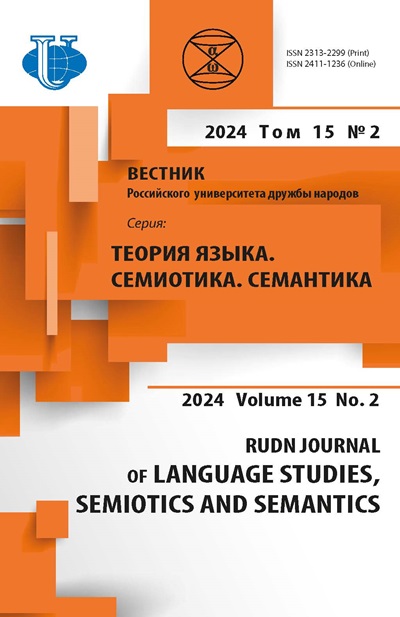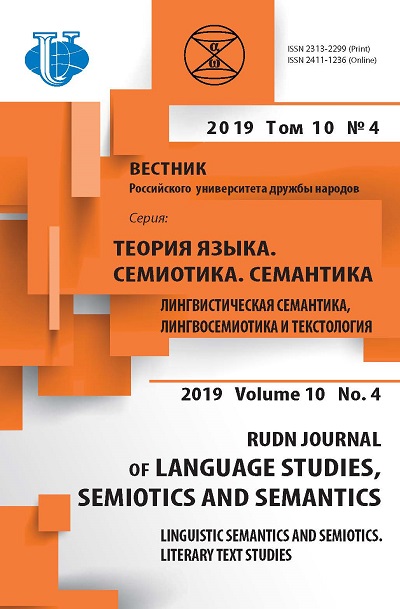Моделирование обобщенного речевого портрета блогера (на материале немецкой военной блогосферы)
- Авторы: Шляховой Д.А.1
-
Учреждения:
- Федеральное государственное казенное военное образовательное учреждение высшего образования «Военный университет» Министерства обороны Российской Федерации
- Выпуск: Том 10, № 4 (2019): Лингвистическая семантика, лингвосемиотика и текстология
- Страницы: 879-892
- Раздел: ФУНКЦИОНАЛЬНАЯ СЕМАНТИКА
- URL: https://journals.rudn.ru/semiotics-semantics/article/view/22774
- DOI: https://doi.org/10.22363/2313-2299-2019-10-4-879-892
Цитировать
Полный текст
Аннотация
Исследование посвящено вопросу моделирования обобщенного речевого портрета субъекта блог-дискурса в речевом пространстве немецкой военной блогосферы. Актуальность работы заключается в развитии методологии моделирования речевого портрета виртуальной языковой личности, за маской которой скрывается личность реальная, активно участвующая в жизни своего интернет-сообщества, объединенного профессиональной деятельностью и национальной принадлежностью. В настоящей работе автор использует примеры из блог-дискурса немецкой военной блогосферы, однако метод построения обобщенного речевого портрета онлайновой личности, основанный на работах профессора Б.Л. Бойко, применим к описанию любой языковой личности в коммуникативном пространстве глобальной сети. Цель настоящего исследования заключается в выделении основных черт для построения обобщенного речевого портрета немецкого военного блогера как субъекта онлайн-коммуникации. Методом сплошной выборки нам удалось выявить типовые особенности речи немецкого военного блогера и его виртуальной языковой личности, к которым относим единицы военной лексики и терминологии, жаргонизмы, профессионализмы, аббревиатуры, устойчивые единицы речевого общения военнослужащих, специфические хэштеги и невербальные знаки, несущие в себе концепты долга, воинственности, патриотизма, скорби и др., связанные с ценностными установками военнослужащих. В результате проведенного исследования мы приближаемся к речевому портретированию более мелких групп внутри социальной группы немецких военных блогеров, например, созданию речевого портрета военного медика, десантника или танкиста. Итоги нашего исследования представляют особый интерес для военных переводчиков, специалистов, занимающихся изучением теории и практики интернет-коммуникации, блог-дискурса, социально-групповой диалектологии. Знание специфики речевых проявлений отдельных социально-групповых общностей позволит по речевым признакам опознать отдельного субъекта онлайн-коммуникации.
Об авторах
Дмитрий Александрович Шляховой
Федеральное государственное казенное военное образовательное учреждение высшего образования «Военный университет» Министерства обороны Российской Федерации
Автор, ответственный за переписку.
Email: magistri@mail.ru
соискатель ученой степени кандидата филологических наук, старший преподаватель кафедры германских языков
ул. Б. Садовая, 14, г. Москва, Российская Федерация, 123001Список литературы
- Рябова М.Э. Языковая личность блогера в современной коммуникации // Организационная психолингвистика. 2018. no 1. C. 39-53.
- Караулов Ю.Н. Русский язык и языковая личность. Изд. 8-е. М.: Книжный дом ЛИБРОКОМ, 2014.
- Юдина Н.В., Кузнецова Е.А. Языковой портрет современного финансиста: учебник для бакалавров. М.: Финансовый университет, 2016.
- Бойко Б.Л. Социально-групповая диалектология: монография. М.: Военный университет, 2018.
- Дейк Т.А. ван, Кинч В. Стратегии понимания связного текста // Новое в зарубежной лингвистике. Вып. ХХIII. Когнитивные аспекты языка. М.: Прогресс, 1988.
- Данилевская Н.В. Языковая игра // Стилистический энциклопедический словарь русского языка. М.: ФЛИНТА. Наука, 2003. [Электронный ресурс] Режим доступа: https://rus-stylistics-dict.slovaronline.com/271-Языковая игра (дата обращения 12.05.2019).
- johannes.clair #Afghanistan, 2010. Режим доступа: https://www.instagram.com/p/Btc9v89hqLn/ (дата обращения: 15.03.2019).
- Бойко Б.Л. Принципы моделирования речевого портрета носителя социально-группового диалекта (к проблеме создания речевого портрета человека на войне) // Вестник Военного университета, 2008. no 2. С. 114-121.
- Девкин В.Д. Немецкая разговорная речь: Синтаксис и лексика. М.: Международные отношения, 1979.
- isabella.brdar URL: https://www.instagram.com/p/BorbFiUB1fR/?utm_source=ig_web_button_ share_sheet (Дата обращения: 17.04.2019).
- Бойко Б.Л. Основы теории социально-групповых диалектов: монография. М.: Военный университет, 2008.
- Шляховой Д.А. Жанровые характеристики блогов как электронных средств массовой коммуникации // Вестник Российского университета дружбы народов. Серия: Теория языка. Семиотика. Семантика, 2017. 8 (4). С. 939-948. doi: 10.22363/2313-2299-2017-8-4-939-948.
- Колокольцева Т.Н. Диалог vs диалогичность в интернет-коммуникации // Интернет-коммуникация как новая речевая формация: колл. монография / науч. ред. Т.Н. Колокольцева, О.В. Лутовинова. 3-е изд., стер. М.: ФЛИНТА, Наука, 2016.
- MATZINGHA, Режим доступа: http://bundeswehr-blog.blogspot.com/2013/12/15-die-spezialgrundausbildung-beginnt.html (дата обращения: 17.06.2019).
- tango.delta.ger, Режим доступа: https://www.instagram.com/p/BuVmOg0HmgM5PN74Ezf FvpqFnelyMOXqGn-5bY0/?utm_source=ig_share_sheet&igshid=s9lhgq5lvby4 (дата обращения: 19.06.2019).
- bloggermuhammad, Режим доступа: https://www.instagram.com/p/BsqiIv5HbNu/?utm_source= ig_share_sheet&igshid=wniwwvzno13r (дата обращения: 1.07.2019).













